|
|
| |
|
|
| |
|
|
|
|
| |
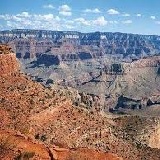 Travel
America Travel
America
Learn before you travel. This section of Fun Easy
English focuses on facts and other cool stuff about
your favorite U.S. state. This is great English
reading practice. This page focuses on the state of
Alabama. |
 Hey
if you cannot understand something on this page, Hey
if you cannot understand something on this page,
then use the Fun Easy English
dictionary
(opens in a new window) |
|
|
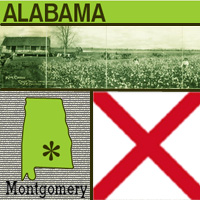 Alabama Alabama
Known as the Heart of Dixie, Alabama became the 22nd
state in 1819. The name Alabama is derived from an
Indian word meaning "thicket clearers." Alabama has
been at the center of many American battles--between
white settlers and Native Americans, and between the
North and South in the Civil War. The state also is
home to the first of three Space Camps in the United
States. These camps let kids experience what it
would be like to be in outer space. The capital is
Montgomery, and state flower is the camellia. |
|
Alabama State Flag
Alabama's state flag is simply a crimson cross on a
field of white. The Alabama legislation does not specify
whether the flag should be square or rectangular (only that
the bars be at least 6 inches broad), and it is seen both
ways.
Alabama Flag Salute
Flag of Alabama I salute thee.
To thee I pledge my allegiance,
my service, and my life.
|
|
Source:
State Symbols USA |
|
|
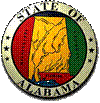 Alabama
State Facts Alabama
State Facts
Picture: state seal of Alabama |
|
State Capital |
Montgomery |
|
Nickname |
Heart of Dixie / Cotton State |
|
Motto |
Audemus Jura Nostra Defendere - (We Dare Defend Our
Rights) |
|
Statehood |
December 14, 1819 (22nd) |
|
Origin of Name |
Means "tribal town" in Creek Indian language. |
|
Largest Cities |
Birmingham, Mobile, Montgomery, Huntsville,
Tuscaloosa |
|
Border States |
Florida, Georgia, Mississippi, Tennessee |
|
Area |
50,750 sq. mi., 28th largest |
|
State Bird |
Yellowhammer |
|
State Flower |
Camellia |
|
State Tree |
Southern Pine (pinus palustris) |
|
State Song |
Alabama |
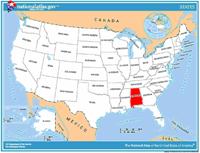 Travel and tourism site
for Alabama - This state travel and territorial tourism
site provides ideas for your vacations, meetings, and more. Travel and tourism site
for Alabama - This state travel and territorial tourism
site provides ideas for your vacations, meetings, and more. |
|
|
Alabama Stories |
|
|
Tennessee Valley Old Time Fiddlers Convention
Have you ever heard some good, old-fashioned fiddle music? You would
if you went to the Tennessee Valley Old Time Fiddlers Convention,
which holds a "fiddle-off" competition each year.
Nicknamed the "Granddaddy of Midsouth Fiddlers Conventions," the
Tennessee Valley Convention is held at Athens State University in
Athens, Alabama. The idea for a convention began in 1967 when a few
musicians who were meeting in a rural Limestone County home decided
it was time to bring fiddling out of the living room and onto the
stage. Back then, square dances were held almost every week, and
fiddlers, guitar and banjo players would play up a storm at homes
and social events.
Today, the convention brings back the tradition of competition in
old-time music. Contestants compete for prize money in 15
categories, including several fiddle and guitar categories,
harmonica, mandolin, old-time singing, banjo, and buck dancing. If
you win the "fiddle-off" competition, you are declared the "Fiddle
King" and take home a trophy and $1,000. |
|
|
Tuskegee University, Alabama
Congress has designated only one college campus in the country as a
National Historic Site: Tuskegee.
Tuskegee Normal and Industrial Institute was founded in 1881 by
Booker T. Washington, an educator and former slave who became one of
the most influential African American leaders in the United States.
The institute later became Tuskegee University. In the beginning,
the school was chartered by the state of Alabama to train African
American men and women in teaching, agriculture, and industrial
trades.
At the invitation of Booker T. Washington, famed botanist George
Washington Carver came to Tuskegee in 1896 to head the agriculture
department. It was there that Carver developed his method of crop
rotation to conserve nutrients in the soil. He also discovered
hundreds of new uses for the peanut and sweet potato. In the 1920s,
the school expanded its mission and offered its students a liberal
arts education. |
|
|
Monroe County Courthouse
Each May in the courtroom and on the lawn of the Old Monroe County
Courthouse, actors put on a production of the Pulitzer Prize-winning
novel To Kill a Mockingbird. Now a museum, the courthouse in Monroe
County, southwestern Alabama, has been called "one of the handsomest
and most conveniently appointed [courthouses] in the state."
To Kill a Mockingbird is a story about a man who is accused of a
crime he didn't commit. The author of the book, Harper Lee, was born
in 1926 and she grew up with the old courthouse as the center of all
activity on the town square. It's easy to imagine how the elegant
courtroom of the old courthouse may have inspired parts of her book.
When the book was made into a movie, it is said that Lee insisted
that the director of the film visit the Old Monroe County Courthouse
before constructing the movie sets. The star of the movie, actor
Gregory Peck, also came to see the courthouse and town. He later
said that the role of Atticus Finch, who is the accused man's
lawyer, was his favorite of all time. |
|
|
DeSoto Caverns
Would you like to go spelunking? Do you know what it is? Spelunking
is the exploration of caves as a hobby, including measuring and
mapping caves and reporting on the plants or other things that grow
in them.
The DeSoto Caverns in north central Alabama are a great place to go
spelunking. They have one of the most awe-inspiring collections of
stalagmites and stalactites found in the United States. A stalagmite
is a cone-shaped mineral deposit that forms upward; a stalactite
forms downward.
The caves have a long history. The earliest inhabitant was Archaic
man (Archaic Period, 8,000 to 1,000 B.C.), a cave-dweller who lived
on small game, fish and nuts. During the 1500s it was explored by
the Spanish. In 1796, Benjamin Hawkins, a U.S. agent appointed by
George Washington, wrote about the magnificent beauty of the DeSoto
Caverns in a report, making it the first officially reported cave in
the United States. During the Civil War, the DeSoto Caverns became a
site for mining saltpeter, used in making gunpowder for the
Confederate Army.
In 1965, the caverns were officially opened to the public. With
high-power electric lights the caverns' colorful beauty could be
fully appreciated. Today, DeSoto Caverns hosts several major weekend
festivals each year. |
|
|
Kentuck Festival of the Arts
Art means different things to different people. For Sam "The Dot
Man," art is all about -- you guessed it -- dots.
If you go to Northport, Alabama, in October you can catch the
Kentuck Festival of the Arts. This two-day event features 300
nationally known artists and crafts people showing and selling their
work. When it began, the festival included mainly local artisans,
some of whom gave demonstrations, such as a woman who showed how to
make thread out of cotton on a spinning wheel. Today some of these
local artists include Sam "The Dot Man" McMillan in his colorful
clothes and hat and Charlie "The Tin Man" Lucas, who makes sculpture
from wire and other people's trash. There's also Jerry Brown, who
continues an unbroken tradition of Southern stoneware pottery that
has been in his family for nine generations.
A "petting zoo" of musical instruments from the Tuscaloosa Symphony
provides other entertainment for kids while everyone admires the
artwork of sculptors, painters and artisans. Children can
participate in hands-on craft projects such as squishing clay
between their fingers, or making paper hats or tie-dyed garments. |
|
|
Roanoke, Alabama: Home of the Ella Smith Doll
How do you feel when your favorite toy is broken? You want to get it
fixed, right? In 1897, a neighborhood girl brought her broken doll
to Mrs. Ella Gaunt Smith of Roanoke, Alabama, to see if she could
fix it. Who would have guessed that this would help start a
business?
Mrs. Smith was a skilled seamstress and amateur photographer before
she started making dolls. When she received the broken bisque (a
type of porcelain) doll, she experimented for two years before she
was able to repair it. She poured the head full of plaster, covered
it with a scrap of stockinet (an elastic knitted fabric), and then
repainted the features. She sewed the head onto the body and
replaced the wig. From this, the Indestructible Ella Smith Doll was
born. In 1901, Mrs. Smith received the first patent on her doll, and
in 1904 she went to the St. Louis Exposition (World's Fair), where
she won a blue ribbon for her dolls.
In the early 1900s, her factory produced 10,000 dolls each year. The
dolls are known by several names: Alabama Baby, Alabama
Indestructible Doll, Roanoke Doll, or Ella Smith Doll. Smith was the
first doll maker in the South to manufacture black dolls -- 10
percent of her dolls were black. Nowadays, an original Ella Smith
Doll is worth as much as $20,000. |
|
|
Vulcan, the World's Largest Cast Iron Statue
You might think a superhero is a man of steel but do you know a man
of iron? Have you ever heard of Vulcan? Taller than a five-story
building, he is a 56-foot cast iron statue of the Roman god of fire.
Vulcan was sculptured in 1904 for an exhibit at the St. Louis
World's Fair. The Commercial Club of Birmingham, Alabama,
commissioned the statue to symbolize the state's leadership in the
production of iron. Not only is Vulcan the largest cast iron statue
in the world, but it is also the second largest statue in America --
only the Statue of Liberty, made of copper and steel, is bigger.
Vulcan was exhibited at the Palace of Mines and Metallurgy at the
World's Fair. At Vulcan's feet were exhibits of Alabama's raw
materials and the products made from them. In his right hand he held
a spear point, while his left hand gripped a hammer resting on an
anvil. When the fair was over, Vulcan was taken apart and
transported back to Birmingham, but when it was put back together
the arms were installed incorrectly! And, after years of neglect,
one of the thumbs rusted and fell off. Now, thanks to recent
repairs, Vulcan once again stands proudly on Red Mountain. |
|
Source:
Library of Congress |
|
 National
Forests and Monuments of Alabama National
Forests and Monuments of Alabama
The following is a description of national
forests and monuments in the state of
Alabama. There are no national parks in this
state. If you plan to visit or live in
Alabama for awhile then you should
definitely plan to visit some of these
fantastic places. |
|
|
|
National Forests |
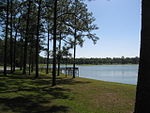 Conecuh Conecuh
Managed together with Alabama's other
National Forests, Conecuh has two areas
designated for recreation: Blue Lake and
Open Pond. The dry, sandy uplands support
longleaf pine forest, while bottomlands have
sinkhole ponds, springs, and swamps. |
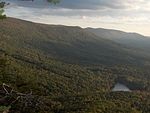 Talladega Talladega
Talladega National Forest includes the
Cheaha and Dugger Mountain wilderness areas.
The Talladega Scenic Byway and Pinhoti
National Recreation Trail cross the forest.
Talladega is managed together with Alabama's
other National Forests. |
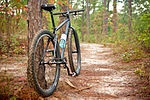 Tuskegee Tuskegee
Tuskegee National Forest's Bartram National
Recreation Trail was Alabama's first
National Recreation Trail. Tuskegee is one
of the smallest National Forests and is
managed together with Alabama's other
National Forests. |
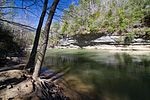 William
B. Bankhead William
B. Bankhead
This forest contains 153 mi (246 km) of
trails and the Sipsey Wilderness, which at
24,922 acres (10,086 ha) is the largest
wilderness area east of the Mississippi
River. It is managed together with Alabama's
other National Forests. |
|
|
|
National Monuments |
 Birmingham
Civil Rights Birmingham
Civil Rights
Preserves the A. G. Gaston Motel, a historic
site related to the civil rights movement in
Birmingham, Alabama. |
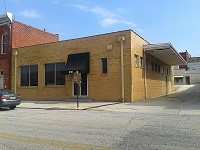 Freedom
Riders Freedom
Riders
Preserves two sites related to the Freedom
Riders in and near Anniston, Alabama during
the civil rights movement—a former Greyhound
bus station in the town and the site of a
bus burning incident outside town. |
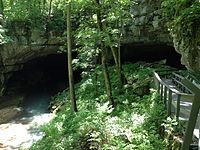 Russell
Cave Russell
Cave
Donated by the National Geographic Society,
the cave's exceptionally large main entrance
was used as a shelter by prehistoric Indians
from the earliest known human settlement in
the southeastern United States. The rock
from which Russell Cave was formed over 300
million years ago at the bottom of an inland
sea that covered the region. |
|
|
|
|
|
|
|
|
|
|
|
|
Cool America |
 About the U.S.A. About the U.S.A.
About the U.S.A. is an American
Studies reader that examines the customs, government, and history of the
United States of America. The text provides a wealth of information on U.S.
geography and history; the roles of local, state, and federal government;
national holidays and symbols; the Constitution; and citizenship. The book,
which was written for intermediate to advanced learners of English, contains
a range of activities for language students to practice listening, speaking,
reading, and writing. (opens to a new PDF window)
Great English reading
practice. |
 About
America About
America
Learn about the fascinating history and government of
the United States of America. Lessons include content on
American Government, American History, and Integrated
Civics. Handouts with interactive games and
student-centered activities encompass all four language
skills: speaking, listening, reading, and writing.
Great English reading practice for
beginning to intermediate students. |
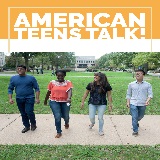 American Teens Talk! American Teens Talk!
Americans Teens Talk! is a collection of interviews of
American high school students. Each interview is accompanied by vocabulary
notes and discussion questions. The interviews in American Teens Talk! give
learners a view into the lives of adolescents in the U.S. Through the
written format of the interviews, learners are able to increase their
vocabulary, practice their reading and listening skills, engage in
discussions, and learn more about U.S. culture. These
interviews come with audio programs.
Great English listening and
reading |
 Sing Out Loud Children's Songs Sing Out Loud Children's Songs
Sing Out Loud Children's Songs includes popular children's songs in the U.S.A. Posters accompany the
individual Sing Out Loud Children's Songs. These
songs come with audio programs.
Great English listening and reading
practice. |
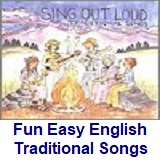 Sing Out Loud Traditional Songs Sing Out Loud Traditional Songs
The Sing Out Loud Traditional Songs
collection contains 13 traditional American folk songs and song lyrics.
Listen to the songs online, read the lyrics, and collect the posters that
accompany the songs. These
songs come with audio programs.
Great English listening and reading
practice. |
 Sing Out Loud American Rhythms Sing Out Loud American Rhythms
Do you love music? Want to use it
to learn English? Check out the hip-hop inspired song "Peace" from Sing Out
Loud American Rhythms. American Rhythms includes a variety of musical genres
from many different artists in the U.S.A. These songs will appeal to teens
and young adults. These
songs come with audio programs.
Great English listening and reading
practice. |
 Route
66 - Famous American Road Route
66 - Famous American Road
U.S. Route 66 (US 66 or Route 66), also known as the Will Rogers Highway, the
Main Street of America or the Mother Road, was one of the original highways in
the U.S. Highway System. The highway, which became one of the most famous roads
in the United States, originally ran from Chicago, Illinois, through Missouri,
Kansas, Oklahoma, Texas, New Mexico, and Arizona before ending in Santa Monica,
California, near Los Angeles, covering a total of 2,448 miles (3,940 km). It was
recognized in popular culture by both the hit song "(Get Your Kicks on) Route
66" and the Route 66 television show in the 1960s. |
Route 66: The Highway That's the Best
(Beginner - Listening)
A video lesson which shows you an interesting place in America.
The English is
spoken at 75% of normal speed.
Great English listening practice.
This video shows travel along Route 66, the most famous road in
America. |
Chicago: The Start of Route 66
(Beginner - Listening)
A video lesson which shows you an interesting place in America.
The English is
spoken at 75% of normal speed.
Great English listening practice.
This video shows travel along Route 66, the most famous road in
America. |
Going West for Decades on Route 66
(Beginner - Listening)
A video lesson which shows you an interesting place in America.
The English is
spoken at 75% of normal speed.
Great English listening practice.
This video shows travel along Route 66, the most famous road in
America. |
Arizona: The Spirit of Route 66
(Beginner - Listening)
A video lesson which shows you an interesting place in America.
The English is
spoken at 75% of normal speed.
Great English listening practice.
This video shows travel along Route 66, the most famous road in
America. |
Route 66 California: The End of the Trail
(Beginner - Listening)
A video lesson which shows you an interesting place in America.
The English is
spoken at 75% of normal speed.
Great English listening practice.
This video shows travel along Route 66, the most famous road in
America. |
Ten Must-See Route 66 Attractions
(Beginner - Listening)
A video lesson which shows you an interesting place in America.
The English is
spoken at 75% of normal speed.
Great English listening practice.
This video shows travel along Route 66, the most famous road in
America. |
Four Famous Foods On Route 66
(Beginner - Listening)
A video lesson which shows you an interesting place in America.
The English is
spoken at 75% of normal speed.
Great English listening practice.
This video shows travel along Route 66, the most famous road in
America. |
International Tourists Drawn to Route 66
(Beginner - Listening)
A video lesson which shows you an interesting place in America.
The English is
spoken at 75% of normal speed.
Great English listening practice.
This video shows travel along Route 66, the most famous road in
America. |
|
|
|
|
Search Fun Easy English |
|
|
|
|
|
|
|
|
|
|
|
|
|
|
|
About
Contact
Copyright
Resources
Site Map |